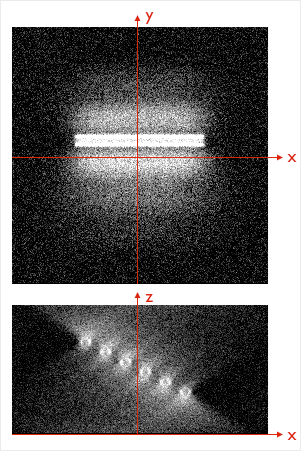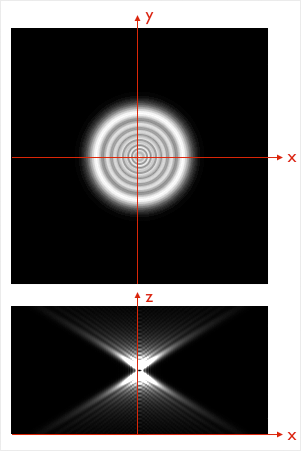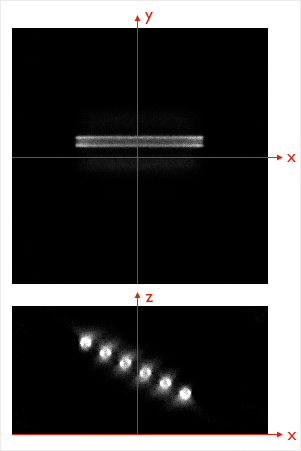DeconvolutionLab
3D deconvolution package for microscopic images

Outline
DeconvolutionLab is a software package (ImageJ plugin) to deconvolve 2D or 3D microscopic images based on the knowledge of the PSF. It implements a variety of deconvolution algorithms: 1) Inverse filter, 2) Regularized inverse filter, 3) Landweber, 4) Threshold Landweber, 5) Tikhonov-Miller, 6) Richardson-Lucy, 7) Richardson-Lucy with TV Regularization. It also includes a convolution tool to generate simulated dataset with additive noise.
Reference
[1] C. Vonesch, M. Unser, "A Fast Thresholded Landweber Algorithm for Wavelet-Regularized Multidimensional Deconvolution," IEEE Transactions on Image Processing, vol. 17, no. 4, pp. 539-549, April 2008.
Software
Specification
DeconvolutionLab is an Java sotware pakage to deconvolve 3D images; it runs as a plugin for ImageJ, the public domain image-processing software. 3D Deconvolution is highly computational; it also requires some understanding of image formation and signal processing to correctly adjust the parameters of the algorithms. DeconvolutionLab incorporates the most known algorithms of deconvolution with theirs parameters. Tuning these parameters could be diffifult in deconvolution and may infer disappointing results. In DeconvolutionLab, these parameters can be choosen by the user or for some of them, they can be automicatilly estimated, which it is one of the main feature of DeconvolutionLab.
A highlight is the optional use of the FFTW package, a library supplying one of the fastest Fourier Transform. DeconvolutionLab includes a distribution both for the Microsoft Window (32 and 64 bits) and for the Apple Mac OSX (32 bits and 64 bits)
Screenshots
 Click to enlarge Mac OSX |  Click to enlarge Windows |
Java and ImageJ prerequirements
The software provided here is a plugin for ImageJ, a general purpose image-processing and image-analysis package. ImageJ has a public domain licence; it runs on several plateforms: Unix, Linux, Windows, Mac OS 9 and Mac OS X. It doesn't take more than a couple of minutes toinstall.
Make sure that you have the good version of Java: at least 1.5, 1.6 recommended; 64-bit version for processing large data sets. To know the version of Java, go to Help>About of ImageJ.
Download and install
Download DeconvolutionLab.zip, the ImageJ's plugin. Put the file DeconvolutionLab.zip in the folderplugins of ImageJ and unzip it. The FFTW libraries for Windows and Mac OSX are included in the package.
Probaby, you will need to increase the allocated memory to ImageJ by Java.
Instructions
- Launch DeconvolutionLab form the menu plugin of ImageJ
- Open the input stack of image to deconvolve.
- Open the PSF stack.
- Select an algorithm and the parameters.
- Select the PSF (click on the Refresh button to have to refresh the list of open images).
- Optional - If you have an ground-truth stack images (only in simulation), you can compute the SER (Signal-to-Error Ratio) by selecting the option.
- Optional - Remove the background.
- Optional - Create snapshot video for every iterations.
- Optional - Apply the algorithm on a reduce part of the image.
- Optional - Activate the FFTW which is faster
- Optional - Activate the batch mode
- Run the deconvolution and observe the log activities in different modes
Conditions of use
You'll be free to use this software for research purposes, but you must not transmit and distribute it without our consent. In addition, you undertake to include a citation whenever you present or publish results that are based on it. EPFL makes no warranties of any kind on this software and shall in no event be liable for damages of any kind in connection with the use and exploitation of this technology.
Examples
1. Synthetic hollow bars
The dataset and the corresponding PSF are avaible at: Deconvolution dataset
 |  |  |
| Input stack of images Synthetic hollow bars Corrupted data by blurring and adding a Poisson noise | PSF 256x256x128 voxels | Output stack of images Deconvolved dataset Algorithm: Richardson-Lucy with TV regularization 40 iterations, lambda=0.001 |
Related Works
- Deconvolution in 3D: an ImageJ plugin, Master thesis, Guillaume Schmit, EPFL, 2007.
- Fitting of 3D-PSF models to fluorescent microbead stacks, Master thesis, Raphaël Frey, EPFL, 2007.
- 3D deconvolution in dynamic microscopy, Master thesis andsoftware "Deconvolution3D", Pierre Besson, EPFL, 2005.
- Fast Multilevel Thresholded-Landweber Deconvolution Algorithm, C&edric Vonesch, EPFL, 2009.
Acknowledgements
- FFTW, the Fastest Fourier Transform in the West, developed at MIT by Matteo Frigo and Steven G. Johnson.
- François Aguet, Florian Luisier and Sathish Ramani for their useful contribution
- Alex Prudencio for the development of GUI


























 1095
1095

 被折叠的 条评论
为什么被折叠?
被折叠的 条评论
为什么被折叠?








